
When you begin constructing your own parks, it becomes apparent that a lot of this detail is built into the game as standard. The basic building blocks will be familiar to anyone who has played a theme park sim before. You lay down pathways and connect them to rides. You bend and twist roller coasters into the shape you desire, test them, tune them, and then open them to the public. You fill the spaces in between with food stalls and gift shops to boost your coffers so you build ever more ambitious creations. You expand until there is no more room to expand into, which in Planet Coaster’s giant building plots will take dozens of hours.
There are a couple of neat little twists on the usual formula. The paths system is designed to produce far more organic-looking arteries running through your park, while entrances and exits to rides can be placed pretty much anywhere you want. Where Planet Coaster really distinguishes itself from the competition, however, is in the little details. Opening a new ride will trigger a small burst of confetti from the entrance gate. Your visitors physically throw items of trash into nearby bins, and your janitors manually empty them. The fixed rides are modelled to microscopic precision with blinking lights and whirring parts.
Frontier’s commitment to the little things has a greater effect than simply making the game look pretty. I found its obsession with detail rubbing off on me. It wasn’t enough simply to build a roller coaster that ticked all the appropriate thrill-boxes; it needed to look the part too, to have props and effects and animatronics that lent a theme and story to the occasion. Soon, this desire stretched from individual rides to entire sections of the park.
Normally I’d be about as interested in these superfluous elements as I am in Michael Portillo’s railway documentaries. But Planet Coaster’s sense of fun is so enchanting that I was completely carried along by it. A few encouragements to think in this manner are built directly into the game. For example, your park visitors can become bored while standing in queues, but it’s possible to alleviate that boredom by placing interesting scenery around the queuing area. In addition, the more impressive your park is overall, the higher its ratings will be, and the more people will visit.
Generally, though, Planet Coaster is propelled more by the player’s imagination than it is the strength of its own systems, and this is perhaps its biggest flaw. As a management sim, Planet Coaster is lightweight. A good example of this is the staff you can hire. There are roughly a dozen different entertainers available to distract your visitors while they linger in ride queues. But in terms of the running of the park, there are only two types of staff available – janitors who keep the park clean, and engineers who fix rides.
This is a pretty accurate measure of Planet Coaster’s priorities between creativity and simulation. You can adjust prices for rides and shops, spend money on researching new rides and coaster types, and embark on marketing campaigns that will attract different demographics of visitors. But unless you’re incredibly cavalier in your spending, you’ll rarely want for money. Similarly, extreme inattentiveness to your visitor’s needs will eventually damage your income. But problems like dirty paths or hungry visitors are easily rectified. Planet Coaster neither offers you any significant challenges or any ingenious methods of dealing with them.
There are a couple of other issues too. The coaster builder is extremely powerful, letting you construct some impressively extreme rides. But it’s also quite fiddly to use. Creating bends and adjusting heights in your coaster is done by clicking and dragging the mouse, which is a rather imprecise solution compared to, say, assigning these commands to the mouse wheel. It’s also quite strict in terms of where you can place things like chain-lifts, speed-boosters, and brakes, which results in a lot of faffing around to ensure your coaster functions.
In addition, I think Planet Coaster would benefit from having a separate 'blueprinting' screen where you could construct custom buildings away from the park itself, as it’s very easy to misplace building components and end up with a half-finished, physics defying jigsaw floating around in your park. An option to save components as something other than 'complete' buildings would be useful too, to make larger constructions easier. Like the coaster builder, Planet Coaster’s building construction is powerful, but not as straightforward to use as it could be.
As a theme park builder, Planet Coaster is unrivalled in its detail and quality. But on a management level it lacks the same spark, the same desire to innovate. If it had pushed the simulation forward in the same way it pushes the creative side forward, you’d be looking at the best theme park builder in existence. Once you stop expanding your park, however, Planet Coaster feels a little too hollow to be considered a true great.
There are a couple of neat little twists on the usual formula. The paths system is designed to produce far more organic-looking arteries running through your park, while entrances and exits to rides can be placed pretty much anywhere you want. Where Planet Coaster really distinguishes itself from the competition, however, is in the little details. Opening a new ride will trigger a small burst of confetti from the entrance gate. Your visitors physically throw items of trash into nearby bins, and your janitors manually empty them. The fixed rides are modelled to microscopic precision with blinking lights and whirring parts.
Frontier’s commitment to the little things has a greater effect than simply making the game look pretty. I found its obsession with detail rubbing off on me. It wasn’t enough simply to build a roller coaster that ticked all the appropriate thrill-boxes; it needed to look the part too, to have props and effects and animatronics that lent a theme and story to the occasion. Soon, this desire stretched from individual rides to entire sections of the park.
Normally I’d be about as interested in these superfluous elements as I am in Michael Portillo’s railway documentaries. But Planet Coaster’s sense of fun is so enchanting that I was completely carried along by it. A few encouragements to think in this manner are built directly into the game. For example, your park visitors can become bored while standing in queues, but it’s possible to alleviate that boredom by placing interesting scenery around the queuing area. In addition, the more impressive your park is overall, the higher its ratings will be, and the more people will visit.
Generally, though, Planet Coaster is propelled more by the player’s imagination than it is the strength of its own systems, and this is perhaps its biggest flaw. As a management sim, Planet Coaster is lightweight. A good example of this is the staff you can hire. There are roughly a dozen different entertainers available to distract your visitors while they linger in ride queues. But in terms of the running of the park, there are only two types of staff available – janitors who keep the park clean, and engineers who fix rides.
This is a pretty accurate measure of Planet Coaster’s priorities between creativity and simulation. You can adjust prices for rides and shops, spend money on researching new rides and coaster types, and embark on marketing campaigns that will attract different demographics of visitors. But unless you’re incredibly cavalier in your spending, you’ll rarely want for money. Similarly, extreme inattentiveness to your visitor’s needs will eventually damage your income. But problems like dirty paths or hungry visitors are easily rectified. Planet Coaster neither offers you any significant challenges or any ingenious methods of dealing with them.
There are a couple of other issues too. The coaster builder is extremely powerful, letting you construct some impressively extreme rides. But it’s also quite fiddly to use. Creating bends and adjusting heights in your coaster is done by clicking and dragging the mouse, which is a rather imprecise solution compared to, say, assigning these commands to the mouse wheel. It’s also quite strict in terms of where you can place things like chain-lifts, speed-boosters, and brakes, which results in a lot of faffing around to ensure your coaster functions.
In addition, I think Planet Coaster would benefit from having a separate 'blueprinting' screen where you could construct custom buildings away from the park itself, as it’s very easy to misplace building components and end up with a half-finished, physics defying jigsaw floating around in your park. An option to save components as something other than 'complete' buildings would be useful too, to make larger constructions easier. Like the coaster builder, Planet Coaster’s building construction is powerful, but not as straightforward to use as it could be.
As a theme park builder, Planet Coaster is unrivalled in its detail and quality. But on a management level it lacks the same spark, the same desire to innovate. If it had pushed the simulation forward in the same way it pushes the creative side forward, you’d be looking at the best theme park builder in existence. Once you stop expanding your park, however, Planet Coaster feels a little too hollow to be considered a true great.

MSI MPG Velox 100R Chassis Review
October 14 2021 | 15:04

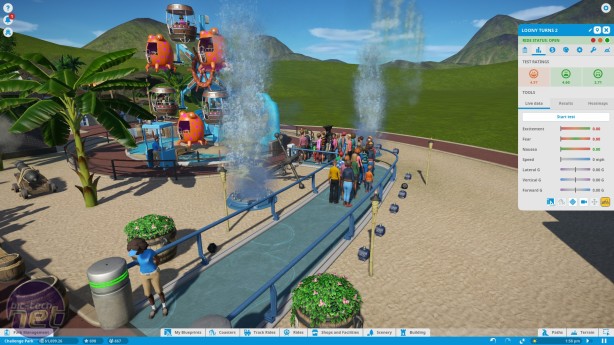
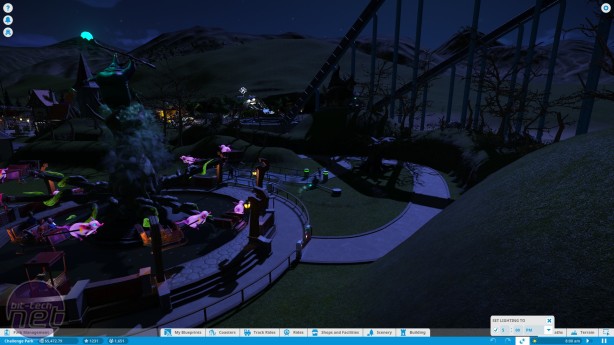
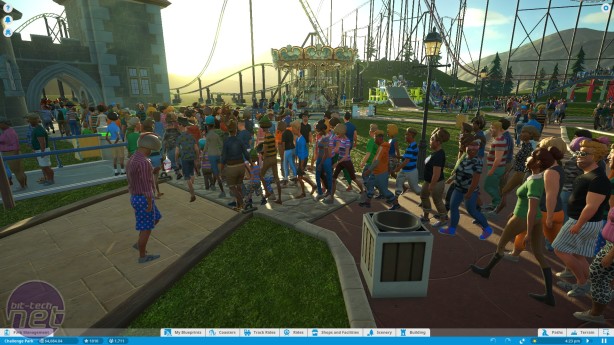
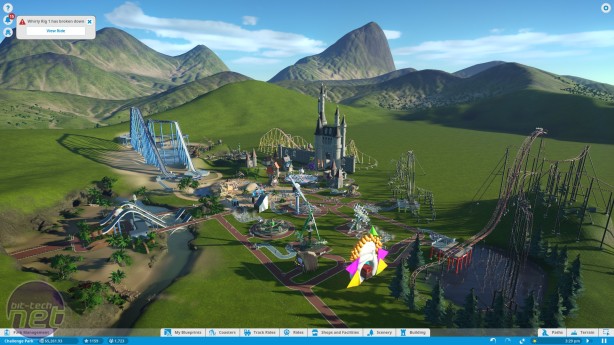
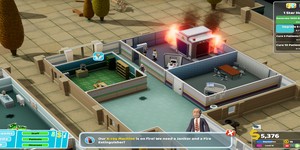
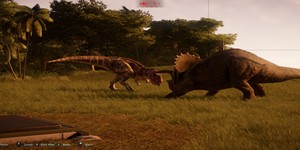






Want to comment? Please log in.